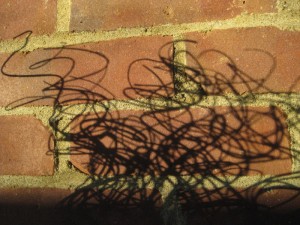I’m fascinated by this optical illusion.
I’m so sure of what I’m seeing here—a gray and white checkerboard—I can hardly believe the demonstration showing how it’s not that simple. Certainty encourages me to dismiss any new information. It limits what I am able to perceive. I can barely take in the information that challenges my understanding because I “know” what I saw. But it turns out I was wrong.
Hmmmm.
I wouldn’t want to go through life never trusting my sense of how things are. I need to rely on my perceptions to get through the day. But I also know from experience that certainty can be misplaced. Past choices that seemed perfectly clear at the time had far more room for questioning than I was able to see. I know now that I knew less than I thought I did back then, if you can follow that convoluted sentence.
But I was generally doing the best I could with what I had. Who can do more than that? It’s what we all do. But it would have been better to ask if there were more to know than what meets the eye. I might have made better decisions if I had been willing to test my assumptions.
Yet even in our lack of wisdom and experience we are given an inner sense of when things are out of balance. When our misperceptions matter, life provides indications that we need to pay closer attention. They accrue until we finally notice.
Within us is a life force, a holy spirit, urging us forward and helping us to transcend illusion. Often it speaks with a still, small voice that helps us know what we need to know, even when thoughts and perceptions are confused. Occasionally it jolts us into waking up to what is going on around us.
Could it be that this clever video is speaking to us of such things, even now?
And if you still don’t believe the squares are the same color, check out this demonstration:
The Checker-Shadow Illusion


